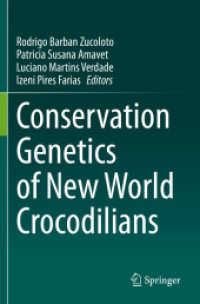- ホーム
- > 洋書
- > ドイツ書
- > Humanities, Arts & Music
- > Religion & Theology
- > practical theology
Description
(Text)
Paul Philippis »Christozentrische Diakonie«-Theologie entdeckt die historischen Bedingungen und Fehlentscheidungen der Diakonie-Geschichte und öffnet den Blick nach vorn: »Wer von der Diakonie recht reden will, muss von der rechten Gemeinde reden.« In einer Zeit der Identitätskrise der Kirche weist Philippi auf den Handlungskörper Gemeinde, damit auch auf eine evangelische Anthropologie des Selbst-, also des Christusbewusstseins: Was kann und darf der Mensch für sich und für den Nächsten sein?Die Beiträge - Vorträge, Vorlesungsthesen, Predigten und bewegend Persönliches - stehen in der theologischen Tradition des Luthertums: zeitbezogen, engagiert, praktisch.[Concept and Form. On Principles of Diaconia]Paul Philippis' theology of »Christocentric diaconia« shows the historical conditions and wrong decisions of the history of diaconia and takes a look ahead: »Who wants to talk about diaconia in the right way, must talk about the right congregation.« In a time of identity crisis ofthe church Philippi points to the congregation as a body of action and therewith also to a Protestant anthropology of self-consciousness (and thus Christ-consciousness): What can and may the human person be for himself and for his neighbour?The contributions - lectures, theses, sermons and personal texts - stand in the tradition of Lutheranism: contemporary, committed, practical.
(Text)
Paul Philippis' theology of "Christocentric diaconia" shows the historical conditions and wrong decisions of the history of diaconia and takes a look ahead: "Who wants to talk about diaconia in the right way, must talk about the right congregation." In a time of identity crisis of the church Philippi points to the congregation as a body of action and therewith also to a Protestant anthropology of self-consciousness (and thus Christ-consciousness): What can and may the human person be for himself and for his neighbour?
The contributions - lectures, theses, sermons and personal texts - stand in the tradition of Lutheranism: contemporary, committed, practical.
(Author portrait)
Philippi, PaulPaul Philippi, Prof. Dr. Dr. mult. h.c., war von 1971 bis 1985 der Direktor des Diakoniewissenschaftlichen Instituts an der Universität Heidelberg. Neben dem Standardwerk »Christozentrische Diakonie«, 1963, ²1975, und »Diaconica«, 1984, ²1989, zahlreiche Veröffentlichungen zu Geschichte und Gegenwart der Diakonie. Philippi lebt nach seiner Emeritierung in Hermannstadt/Sibiu - Rumänien.Albert, JürgenJürgen Albert, Dr. theol., Dr. phil., war wissenschaftlicher Assistent bei Paul Philippi, zuletzt Leiter der Abteilung Theologie und Information im Diakonischen Werk in Hessen und Nassau in Frankfurt am Main.







